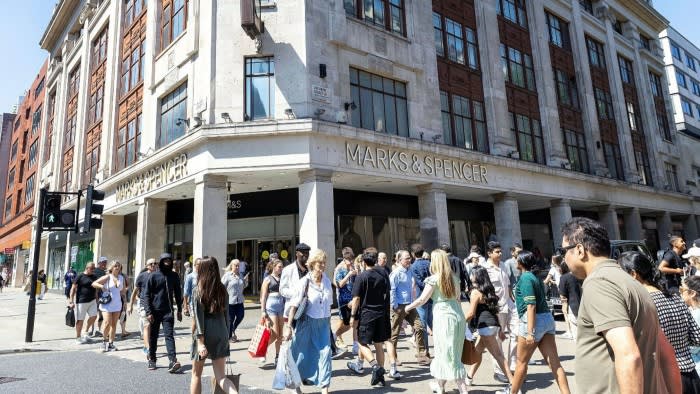Stay informed with free updates
Simply sign up to the Investments myFT Digest — delivered directly to your inbox.
In late 2019, Marks and Spencer poached Tesco executive Richard Price to head up its clothing and homeware arm. The business needed all the help it could get; in contrast to the company’s bustling food halls, divisional sales had been on a downward trajectory for several years.
Price rejoined M&S the following summer — having previously been a director in its menswear unit between 2008 and 2012 — and has had a big impact. The clothing and home business reported sales of £3.9bn last financial year, edging it closer to the highs of £4bn achieved a decade ago. Meanwhile, adjusted operating profit exceeded £400mn, well above the levels seen just before the pandemic hit.
Despite initial scepticism over the group’s turnaround plan, margins are widening, like-for-like sales growth is positive and “style perception”, an internal metric, is on the up.
This transformation, combined with a very strong performance in groceries, has driven up M&S’s share price. Shares have climbed by a fifth since the start of 2024 and are up by 180 per cent over the past two years. After a four-year absence, the company rejoined the FTSE 100 last September.
Price is now cashing in some of his winnings. The managing director sold 200,000 shares this month for £3.31 each, or a total of £661,300. No reason was given for the disposal.
The company is not scheduled to update investors again until its half-year results in November. Analysts are feeling chipper, however. HSBC upgraded the group to a “buy” in June, citing its stronger balance sheet and wider appeal. It also noted the acquisition of Gist in 2022 has transformed the company’s food supply chain.
There is still plenty of work to do. An expensive store rotation scheme is ongoing and the group is still making some fairly sizeable adjustments to its profits because of this. For now, though, M&S has regained its sparkle among investors.
AJ Bell chief rings up sale
A hefty sale of 450,000 shares at 445p apiece netted £2mn for Lucy Summersgill, a “person closely associated” with investment platform AJ Bell chief executive Michael Summersgill. He retains a holding of over 593,000 shares, or 0.14 per cent of the company.
Offloading a large position at this stage has a logic to it given AJ Bell’s strong recent performance — the shares are up 42 per cent in the year to date.
Summersgill is now well over two years into his tenure, having been promoted from chief financial officer in 2022, when founder Andy Bell decided to step back. Summersgill was CFO at AJ Bell from 2011.
Under Summersgill’s leadership, the company has performed well during the high interest rate era, gaining market share from sector leader Hargreaves Lansdown. It was also quick to improve the interest rates it offers on customers’ cash holdings, after sector-wide pressure from regulators concerned about how platforms make money from client cash on deposit. Interest income remains a considerable source of profit for the platforms, though it is fair to say that AJ Bell is not as dependent on this income stream as some of its competitors.
Analysts think the good run can continue even as base rates start to come down. Broker Panmure Liberum describes the company as “a winner in the long term as markets continue their recovery”.
“We believe that the market is still overestimating the company’s sensitivity to a reduction in base rates, which has led to an unjustified divergence between the share price and earnings since 2022, but these concerns should dissipate going forward,” Panmure analysts say.


